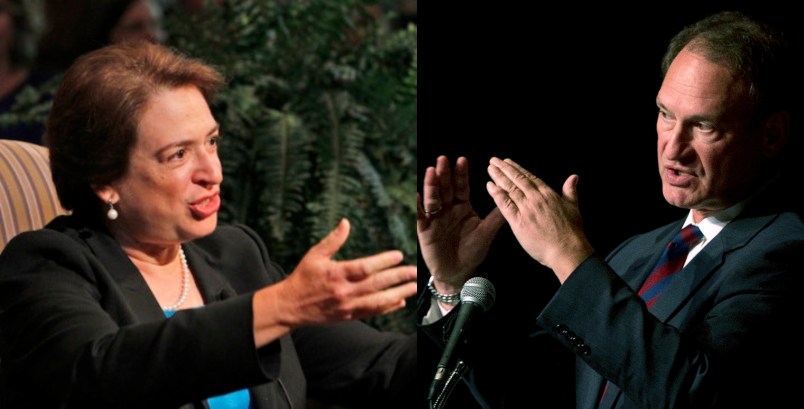Justice Elena Kagan argued Monday that the Supreme Court went “far astray” from constitutional principles when narrowly ruling that a New York town may begin its public meetings with a prayer that tends to be Christian.
In her dissenting opinion against the 5-4 ruling, the Obama-appointed justice accused the court’s conservatives of “blindness” to the secularism principles at stake, particularly the rights of religious minorities.
“I have no doubt that every member of this Court believes as firmly as I that our institutions of government belong equally to all, regardless of faith. Rather, the error reflects two kinds of blindness,” Kagan wrote. “First, the majority misapprehends the facts of this case, as distinct from those characterizing traditional legislative prayer. And second, the majority misjudges the essential meaning of the religious worship in Greece’s town hall, along with its capacity to exclude and divide.”
In the controlling opinion, Justice Anthony Kennedy decreed, “The town of Greece does not violate the First Amendment by opening its meetings with prayer that comports with our tradition and does not coerce participation by nonadherents.” He argued that “nonbelievers” could “choose to exit the room during a prayer they find distasteful” and that they were in no way coerced into taking part in the prayer.
Justice Clarence Thomas, joined by Justice Antonin Scalia, penned a separate opinion agreeing with the outcome but adding that there is no violation of the Establishment Clause if a person feels affronted by “the expression of contrary religious views in a legislative forum.”
In a move that seemed to hit a nerve with Justice Samuel Alito, Kagan warned of several problematic situations that could comply with the Court’s reasoning, such as a judge ordering a courtroom to rise before a Christian prayer and a local polling place requiring entrants to join an official in a Christian prayer.
Alito snarked that Kagan’s logic was “really quite niggling” and that it was her — not the conservative majority — that went “far astray” from the Constitution.
“I am troubled by the message that some readers may take from the principal dissent’s rhetoric and its highly imaginative hypotheticals,” the Bush-appointed justice wrote in his own opinion concurring with Kennedy’s. “Although I do not suggest that the implication is intentional, I am concerned that at least some readers will take these hypotheticals as a warning that this is where today’s decision leads—to a country in which religious minorities are denied the equal benefits of citizenship. Nothing could be further from the truth.”
Kagan responded to the swipe. In a footnote, she called out Alito by name and reminded him that the board’s prayer practices have been exclusively Christian for more than a decade.
“JUSTICE ALITO similarly falters in attempting to excuse the Town Board’s constant sectarianism,” she wrote. “That the concurring opinion thinks my objection to that is ‘really quite niggling’ … says all there is to say about the difference between our respective views.”
The case is Town of Greece v. Galloway. Read the majority, concurring and dissenting opinions below. Kagan’s dissent was joined by Justices Ruth Bader Ginsburg, Stephen Breyer and Sonia Sotomayor.
(Photo credit: AP. Split by TPM’s Brendan James.)







In other words, the neocons on the SCOTUS are religious bigots.
Kennedy’s comments about Greece and leaving the room was ignorant. How else can we identify those nonbelievers and shun them in the political process when they don’t take part in OUR brand of mysticism. What about the slippery slope of broccoli, justice Bozo.
I think he’s saying that if anybody is offended by my hedonist nudity, they can leave the room. Right?
Once Kennedy started with ‘higher power than government’ I could see we were in for a sad, long ride. Next it’s Fawn Hall’s excusing the destruction of documents with her 'Sometimes you have to go above the law" (Oliver North’s secretary) which rings eerily similar to Adolf Eichmann’s rationale for what he did: He obeyed “the principle behind the law” which in his case came to him in the form of the Furher’s voice.
It is mindboggling that the supposedly strict Constitutionalists on the Supreme Court believe that the First Amendment allows for prayer in a government meeting. How is invocation of any religion ever appropriate on the occasion of the conduct of government business? Unless this is now just government of, by, and for the Christian people…
And we need to get rid of that “In God We Trust” junk, too. God certainly isn’t doing very well by us lately.